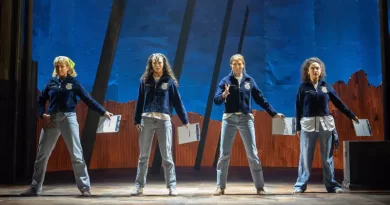“The Inspector” at Yale Rep
Robert Schneider in New Haven, Connecticut
21 March 2025
Am I suffering from blue funk? Advanced anhedonia? How is it possible that I could see Yura Kordonsky’s new adaptation of Nikolai Gogol’s classic farce The Inspector at Yale Rep and not have a deliriously good time from start to finish?

Samuel Douglas and Nomè SiDone.
Photo credit: Joan Marcus.
I don’t think the play is at fault; it’s been amusing people consistently for almost two centuries. It was already a popular favourite when Serebryakov, in Chekov’s Uncle Vanya, uses a tag line from The Inspector to try and get a laugh from a household that has no inclination to laugh—and that was in 1897.
Nor do I think the production can be blamed. The Rep has used the occasion to put a dozen of its best acting students and recent graduates on stage together; they bring energy, elan and ingenuity to the project. And while the acting is never tame, there is none of the pushiness young actors occasionally exhibit. It’s a wonderful play for an alert and inventive ensemble, as was the case last night. It’s also a glittering promotional message for Yale’s actor training programme.
A small provincial town gets into a tizzy when a letter arrives announcing that a government inspector is coming incognito to examine local affairs. Coincidently, a young, low-level government clerk from the capitol is stranded at the inn and unable to pay his bill. A local stooge decides that the clerk can only be the inspector: he orders the best of everything and never pays a kopek. Once this fatal misidentification is made, there’s no going back; the entire apparatus of town government sets about kow-towing to a nobody while pretending he’s simply a visitor from Saint Petersburg—the inspector is here incognito, right? The clerk can’t imagine why everyone is so accommodating, but he’s happy to play along.
The scheming mayor (Brandon E. Burton) picks up the clerk’s bill at the inn and invites him to stay at his own house. He then takes him on a quickly-organized tour of the town’s departments where he is wined and dined in succession by the district medical officer (Whitney Andrews), the school superintendent (John Evans Reese), the judge (Darius Sakui) and the postmaster (Annelise Lawson). Roaring drunk, the clerk regales them all with wild tales of his power and prestige. He wildly exaggerates his social standing and makes fantastic claims for his intellect and talent in the arts, especially literature (he claims to have written Goethe’s Faust). Is he lying or is he dreaming out loud? Deceitful or delusional?
And while this famous scene was played flawlessly, it’s at precisely this moment that I felt my pleasure slipping away. Somehow tales of rampant graft, arbitrary displays of power and an ego inflated to the point of bursting don’t seem funny right now. Government officials, normally capable, cowed in the face of a single overweening individual? Intimidation and innuendo used to shake down bureaucrats for loans on the thinnest of pretexts? It’s just not as amusing as it ought to be. The play was scandalous when first produced but became a hit when the tsar decided it was harmless.
Critic D.S. Misky described the fraudulent inspector—who succeeds only because the town officials are nincompoops—as being “full of meaningless movement and meaningless fermentation incarnate, on a foundation of placidly ambitious inferiority.” His words seem strangely apropos of a certain political leader today. If The Inspector is still a satire, it’s a satire constructed on the pack ice of current pathologies.
The second act, in which the clerk sets about romancing the mayor’s wife (Elizabeth Stahlmann) and daughter (Chinna Palmer) is much more enjoyable. Nothing is in peril here except the ladies’ hearts and reputations. We know they’ll be disappointed when the scallywag finally skips town, but their hearts (and probably their reputations) will heal. The town, however, has lost its self-respect and all its cash. It trembles when the arrival of the real government inspector is announced.
As the faux government inspector, Samuel Douglas is brash and self-righteous, indignant when he’s broke and loudmouthed when he’s flush. As the local man who first identifies the inspector, Edoardo Benzoni does a wonderful comic turn with the entire company. Grayson Richmond plays the local doctor who pours out his heart to the faux inspector in German because he speaks no Russian. The actors have created characters as expressive as Daumier cartoons.
KT Farmer’s costumes are timelessly hick. They show stains from salt and snow. Silin Chen’s whimsical set, in fact, is ankle-deep in snow, creating a permanent confusion of indoor and outdoor spaces. In dream sequences, the town is overrun with well-dressed rats and other strange creatures. Even the faux inspector meets his comeuppance in dreamland: he’s beset by an army of masked figures who resemble him. Which of his many selves is real?
Yura Kordonsky’s adaptation is always clear and playable. He also directed. There will be another production (different version) at the Chichester Festival Theatre in England this summer. The contemporary relevance is being noted!









